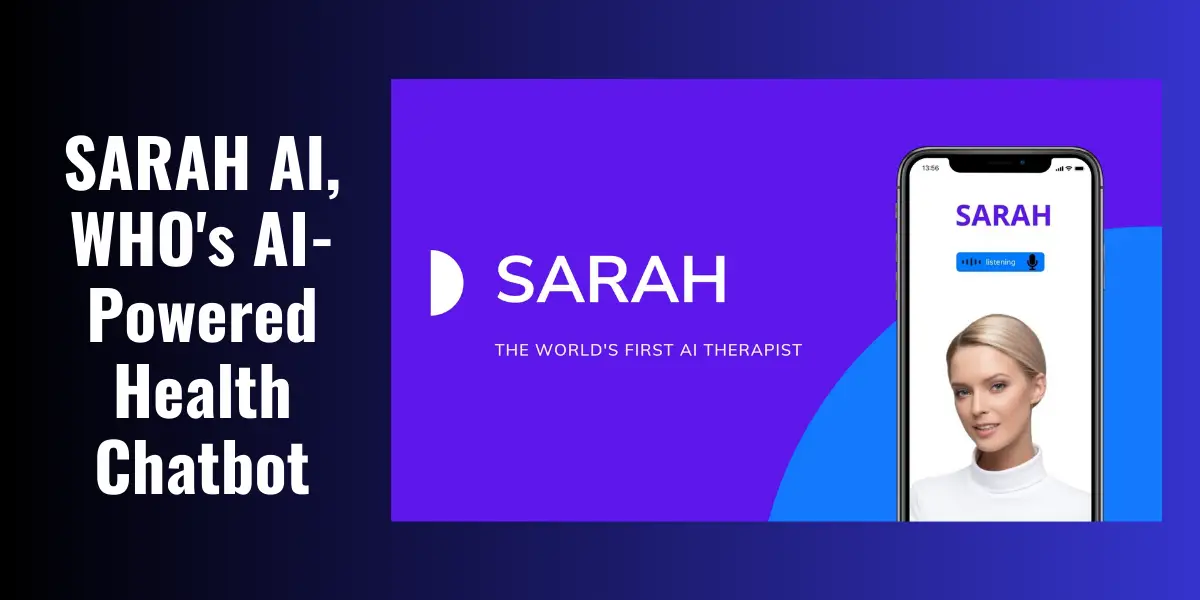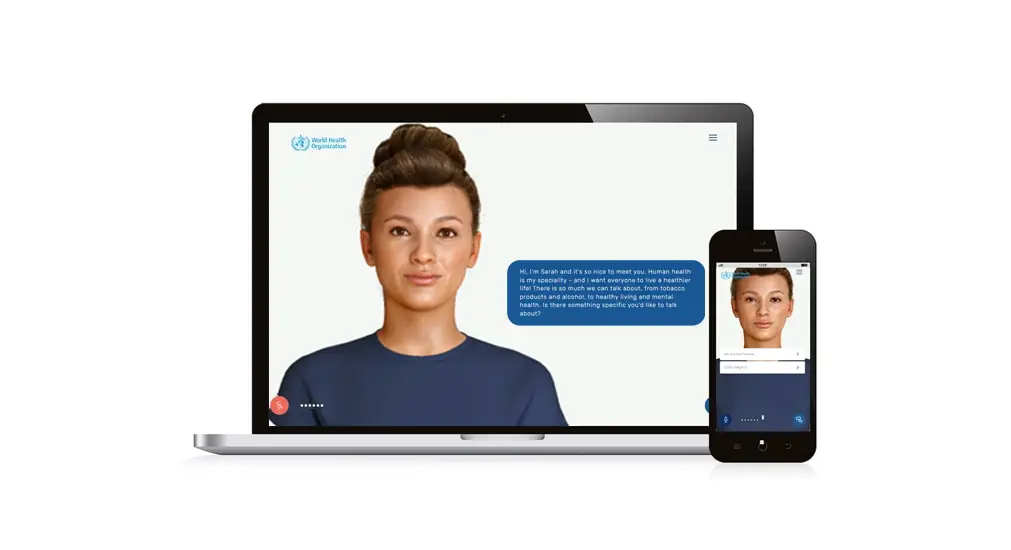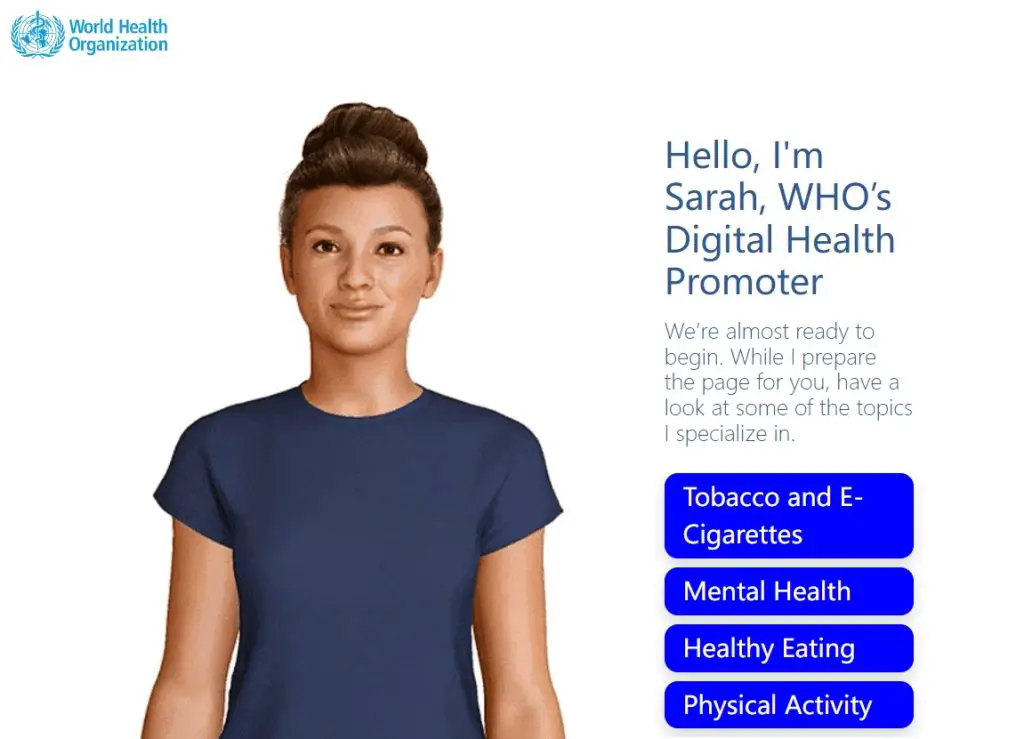What is SARAH AI, WHO's AI-Powered Health Chatbot?

SARAH AI is a virtual health worker developed by WHO to offer health-related information and advice. It’s designed to be available 24/7 in eight different languages, focusing on health promotion and public health awareness. Despite its potential, SARAH has experienced some limitations and criticism due to its AI technology.
SARAH AI is an intelligent health assistant developed by the World Health Organization and is designed to provide basic health information. Despite its potential, SARAH has accuracy and privacy issues. This article introduces SARAH’s capabilities, supported languages, and its role in health promotion.
Table of Contents
What Does SARAH Do?

SARAH is a virtual health worker designed to interact with users and provide general health information. It engages users in conversation to address various health topics and offers guidance for leading a healthier lifestyle. Here are some key areas where SARAH contributes:
Health Information and Advice
SARAH serves as a source of general health information, offering tips and advice on various topics.
- SARAH can answer questions about mental health, tobacco use, and nutrition.
- It guides users toward healthier lifestyle choices, focusing on exercise, diet, and stress management.
- SARAH provides resources and directs users to additional WHO information for more details.
SARAH’s conversational style makes it accessible to a wide audience, aiming to educate and promote public health.
Promoting Health and Well-being
SARAH focuses on promoting health and well-being through interactive communication with users.
- It provides guidance on leading a healthier lifestyle, including exercise and balanced diets.
- SARAH encourages users to adopt habits that support mental and physical health.
- The chatbot also raises awareness about public health issues, such as smoking and road safety.
SARAH aims to be a supportive resource for those seeking advice on maintaining a healthy lifestyle.
Addressing Health Concerns
SARAH addresses common health concerns and provides advice to users seeking help.
- It engages with users to discuss topics like stress management, tobacco cessation, and general health tips.
- SARAH helps bridge the gap in health education, especially where healthcare resources are limited.
- By offering accessible information, SARAH contributes to raising awareness about health-related topics.
SARAH’s role is to offer support and direct users toward additional resources when needed.
What Languages Does SARAH Support?

SARAH supports eight languages, allowing it to reach a diverse and global audience. Here’s a list of the languages SARAH communicates in:
Arabic
Chinese
French
Russian
English
Spanish
Hindi
Portuguese
This multilingual approach ensures that SARAH can interact with users in their preferred language, facilitating better communication and understanding.
SARAH’s language support reflects its goal of providing accessible health information to people from various linguistic backgrounds. The diversity of supported languages enhances its impact and allows WHO to reach a wider audience with its health promotion efforts.
How Does SARAH Promote Health?
SARAH promotes health through a variety of approaches, emphasizing general well-being and health education. The chatbot engages users in meaningful conversations and provides guidance on leading a healthier lifestyle. Here are some key ways SARAH promotes health:
Encouraging Healthy Habits
SARAH motivates users to adopt healthy habits that contribute to overall well-being. It offers suggestions for balanced diets, regular exercise, and stress management. The chatbot’s conversational style helps users feel engaged and motivated to make positive lifestyle changes.
Addressing Mental Health Issues
SARAH provides support for mental health concerns by discussing topics like stress, anxiety, and mindfulness. It offers guidance on managing stress and directs users toward additional mental health resources when needed. SARAH’s empathetic communication style aims to create a supportive environment for users seeking mental health advice.
Raising Public Health Awareness
SARAH helps raise awareness about public health issues, such as smoking cessation, road safety, and preventive healthcare. By promoting awareness, SARAH encourages users to make informed decisions that contribute to their well-being. The chatbot’s role in public health promotion aligns with WHO’s broader mission to improve global health outcomes.
Limitations of SARAH
SARAH, the AI-powered health chatbot developed by WHO, offers valuable health information and advice, but it has some limitations that users should consider. These limitations stem from the technology’s early-stage development and reliance on older AI models, which affect its accuracy and depth. Here are some key limitations of SARAH:
- Accuracy: SARAH’s responses may contain errors or outdated information due to the AI model’s training on older datasets.
- Lack of Diagnostic Capability: The chatbot is not equipped to provide specific medical advice or diagnose health conditions.
- Limited Scope: SARAH often redirects users to WHO resources or advises them to consult healthcare providers for more complex issues.
- Hallucinations: The AI model can produce bizarre or incorrect answers, which may lead to misinformation or confusion.
- Privacy Concerns: While SARAH prioritizes user privacy, the use of cameras and microphones can raise privacy and security concerns.
These limitations suggest that SARAH should be used as a complementary resource and not as a substitute for professional medical advice or in-depth health information.
What Issues Does SARAH Encounter?
SARAH has encountered several issues in its implementation, stemming from its reliance on AI technology and its developmental stage. These issues affect the chatbot’s reliability and the quality of information it provides.
Accuracy and Hallucinations
SARAH’s accuracy is limited due to its AI training, which can cause it to provide incorrect or outdated information. Hallucinations, where the AI generates bizarre or nonsensical responses, pose a risk of misinformation. This issue requires users to verify SARAH’s advice with other reliable sources to avoid potential confusion or harm.
Lack of Depth and Scope
SARAH’s responses often lack depth and are restricted to WHO’s purview. The chatbot is not equipped to discuss specific drugs or provide detailed medical advice. This limitation means that SARAH often redirects users to external resources or suggests consulting healthcare professionals for more complex issues.
Technical Limitations
SARAH may encounter technical limitations that affect its functionality. The AI model used for training might not always be up-to-date, leading to a lack of current information. Additionally, SARAH might not be able to answer certain questions, indicating a need for further training and development.
How Does SARAH Ensure User Privacy?
SARAH prioritizes user privacy and follows strict guidelines to protect personal information. The chatbot’s design includes several measures to ensure that user interactions are secure and anonymous. Here are the key privacy measures employed by SARAH:
Anonymous Sessions: Each interaction with SARAH is anonymous, and the chatbot does not retain personally identifiable information.
Data Deletion: SARAH deletes facial expression data after 30 seconds, ensuring that sensitive information is not stored.
Privacy Regulations: SARAH complies with WHO’s privacy practices and follows regulations to ensure that user data is protected.
Limited Data Access: Government partners and researchers do not have regular access to user data unless they request voluntary survey data, adding an additional layer of security.
Secure Communication: SARAH uses secure communication channels to protect against unauthorized access and cyber threats.
These privacy measures aim to ensure that SARAH provides a safe and secure environment for users, reducing the risk of privacy breaches and ensuring that users can interact with the chatbot without compromising their personal information.
How Can Users Give Feedback?
User feedback is vital for SARAH’s development, enabling the World Health Organization (WHO) to identify areas for improvement and address potential issues. The feedback process provides users with various avenues to share their experiences, opinions, and suggestions for making SARAH more reliable and user-friendly. Here are the primary ways users can give feedback about SARAH:
Surveys and Questionnaires: WHO occasionally distributes surveys to gather user feedback on SARAH’s performance and effectiveness. These surveys allow users to share their experiences and suggest improvements.
Official Contact Channels: Users can provide feedback directly to WHO through its official communication channels, such as email or phone. This direct contact allows for more detailed feedback and specific concerns to be addressed.
Social Media Platforms: WHO encourages users to share their thoughts about SARAH on social media. This feedback helps WHO understand user sentiment and identify any recurring issues or trends.
WHO Website: The WHO website provides a platform for users to leave feedback or ask questions about SARAH. This centralized approach makes it easier for WHO to collect and analyze user feedback.
Who Are the Creators of SARAH?
SARAH was developed by the World Health Organization (WHO) in collaboration with several technology partners and creative agencies. The collaboration brought together expertise in AI technology, virtual avatars, and health promotion to create an interactive health chatbot. The following are the key contributors to SARAH’s development:
- World Health Organization (WHO): WHO is the primary creator and overseer of SARAH. It plays a central role in setting SARAH’s objectives, guiding its development, and ensuring that the chatbot adheres to WHO’s health standards.
- Soul Machines Limited: This technology company, based in San Francisco and New Zealand, specializes in AI-driven avatars. Soul Machines developed SARAH’s AI technology and ensured its interactive capabilities.
- Rooftop: A creative agency based in South Africa, Rooftop was involved in the design and development of SARAH’s virtual avatar. This collaboration ensured that SARAH had a humanlike appearance and could engage users in a friendly manner.
- Other Collaborators: SARAH’s development also involved other researchers, health experts, and technology professionals. This diverse team worked together to create a chatbot capable of promoting health and well-being.
How Does SARAH Compare to Other Health Chatbots?
SARAH, as an AI-powered health chatbot, has some similarities with other health chatbots, but also distinct differences. Here’s an overview of how SARAH compares to other health chatbots, highlighting key areas of similarity and divergence.
Common Features with Other Health Chatbots
SARAH shares common features with other health chatbots, demonstrating the typical functionality of AI-driven health assistants:
- Like other AI chatbots, SARAH provides general health information and advice to users.
- It engages users in a conversational manner, making health information more accessible and interactive.
- SARAH focuses on promoting health and well-being, similar to other chatbots that aim to encourage healthier lifestyles.
These commonalities reflect the general approach of health chatbots in offering accessible health information and guidance.
Unique Features of SARAH
SARAH has unique features that set it apart from other health chatbots, driven by its focus on WHO’s guidelines and public health:
- SARAH is designed specifically to promote health and well-being, emphasizing general health education and awareness.
- Unlike some diagnostic chatbots, SARAH does not offer specific medical advice or diagnose health conditions. It focuses on general health promotion.
- SARAH operates with WHO’s backing, which provides a level of credibility and aligns the chatbot with global health standards.
These unique features distinguish SARAH from other health chatbots, emphasizing its role in health promotion and WHO’s involvement in its development.
Areas for Improvement
SARAH has areas for improvement compared to other health chatbots, highlighting where it could become more competitive:
- SARAH’s responses can sometimes lack depth and accuracy, requiring more robust AI training.
- It doesn’t provide detailed medical advice, limiting its scope compared to some other chatbots.
- SARAH’s reliance on older AI models can lead to outdated or incorrect information, suggesting the need for continuous development.
These areas indicate that while SARAH has a unique approach, it must evolve to compete with other health chatbots in terms of accuracy, depth, and reliability.
Conclusion
SARAH AI represents WHO’s effort to leverage AI technology for health promotion and education. Despite its limitations and occasional inaccuracies, SARAH has the potential to contribute to public health awareness. Users should approach SARAH with an understanding of its limitations and use it as a complementary resource rather than a substitute for professional medical advice.

